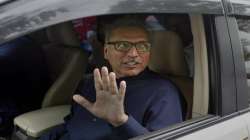Pak achieved nuclear capability 'within 7 years' of India carrying out its first nuke test in 1974: Prez
Addressing the flag hoisting ceremony held at the President House to celebrate Pakistan's 75th Independence Day, Alvi said over the past 74 years, "three wars were forced upon us", however, the nation kept moving on despite the challenges.

Achieving nuclear capability "within seven years" of India carrying out its first nuclear test in 1974 was among Pakistan's big achievements since it became independent, President Arif Alvi said on Saturday, indicating that the country became a nuclear power much before its official announcement in 1998.
Addressing the flag hoisting ceremony held at the President House to celebrate Pakistan's 75th Independence Day, Alvi said over the past 74 years, "three wars were forced upon us", however, the nation kept moving on despite the challenges.
Recounting Pakistan's accomplishments, the president said the country performed many great deeds since Independence and among the big achievements was to gain nuclear capability.
"When India in 1974 carried out its nuclear test, Pakistan managed to create a nuclear deterrent within just seven years after that through its intelligence and hard work and it joined those nations which were developed and were equipped with nuclear weapons for their defence,” Alvi said.
India on May 18, 1974 conducted its first nuclear test, codenamed 'Smiling Buddha', in Rajasthan's Pokhran, becoming a nuclear power.
In May 1998, India again conducted a series of nuclear tests at the same location (called Pokhran-II tests).
In response to Pokhran-II tests, Pakistan on May 28, 1998 conducted five simultaneous underground nuclear tests at Ras Koh Hills in Chagai district of Balochistan province. Codenamed Chagai-I, it was Pakistan's first public test of nuclear weapons. The second nuclear test, Chagai-II, followed on May 30 in the same year.
Discussing the challenges Pakistan was facing, Alvi said there is an ongoing race for weapons in the region and the country has been trapped into a regional arms race. Despite this, he said, the country, which is essentially an agricultural economy, managed to meet its food requirements and is now on the way to becoming an industrial nation.
“Pakistan is also advancing in information technology,” the president said.
Speaking on terrorism, Alvi said Pakistan had successfully fought the menace. The country lost around 100,000 lives and suffered around USD 150 billion in economic losses, “but came out victorious".
He said Pakistan has been hosting over 3.5 million refugees for decades.
“3,500,000 Afghan refugees came to Pakistan and we gave them refuge without depending on anyone else, showcasing our hospitality,” Alvi said.
The president appreciated the efforts of the government in handling the coronavirus crisis. "Our success against the coronavirus is our strength," he said.
He also raised the Kashmir issue and expressed solidarity with the people of the Valley.
President Alvi also called for peace in Afghanistan and said he was hopeful that peace would be restored in the country.
Separately, Prime Minister Imran Khan in his Independence Day message said Pakistan wants peace with all neighbours to focus on the socio-economic development of the country.
“We want peace within and peace without, to pursue our socio-economic agenda. Naya (new) Pakistan has shifted its focus from geo-politics to geo-economics, with the well-being and welfare of our people as the topmost priority,” he said.
Khan said Pakistan rendered immense sacrifices and paid a heavy price for instability on its western border.
“We have consistently stressed that there is no military solution to the conflict in Afghanistan,” he said, adding that Pakistan will continue to support a negotiated political settlement for durable peace and stability in the neighbouring war-torn nation.
Meanwhile, Independence Day was celebrated with zeal and fervour across Pakistan. The day dawned with a 31-gun salute in the federal capital Islamabad and 21-gun salutes in the provincial headquarters.
The national flag was hoisted at all important public and private buildings. Buildings, streets and markets were illuminated to mark the event.
Also Read: BSF, Pak Rangers exchange sweets at Attari-Wagah border near Amritsar on Pakistan's I-Day
Also Read: Pakistani forces clash with Afghan Protesters after man dies waiting to enter Chaman Border